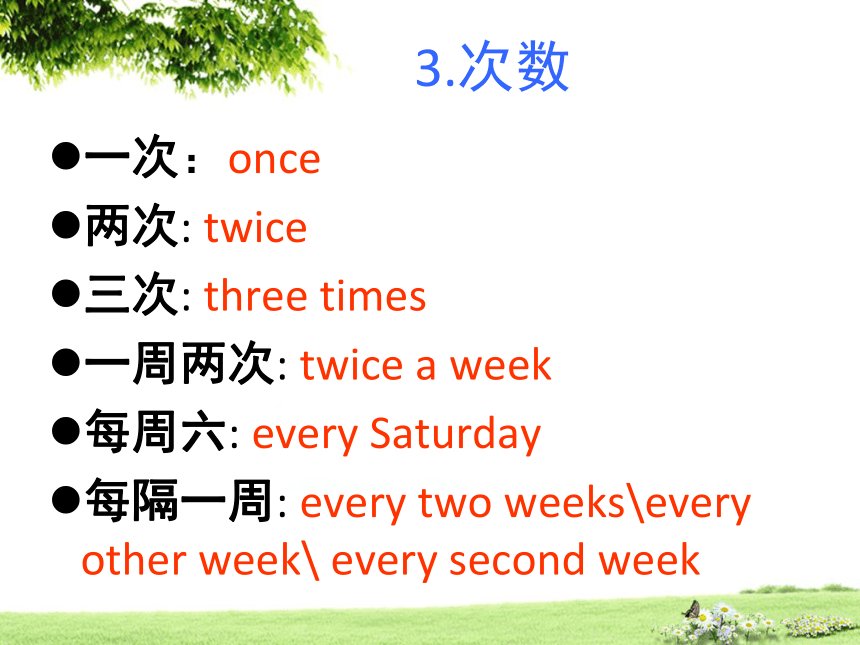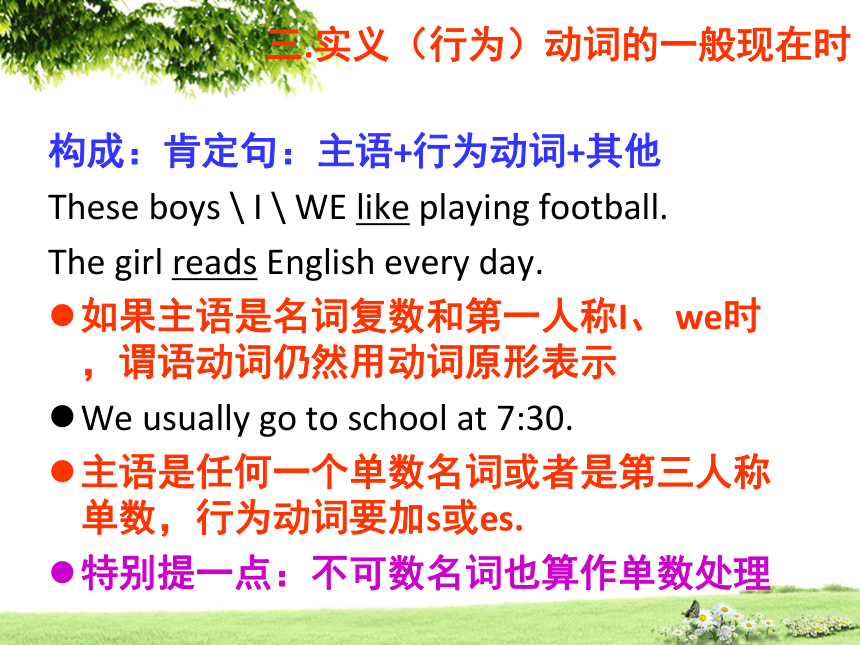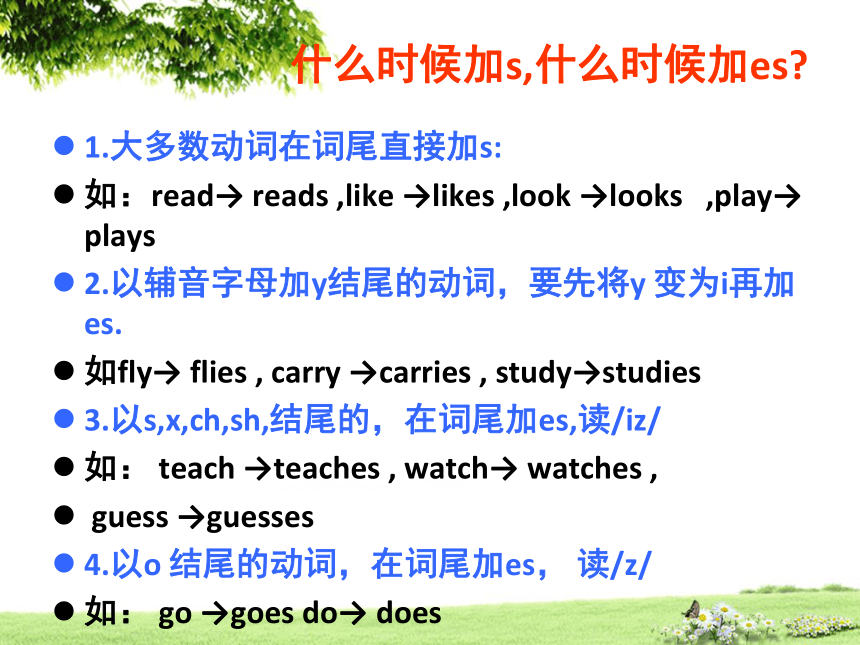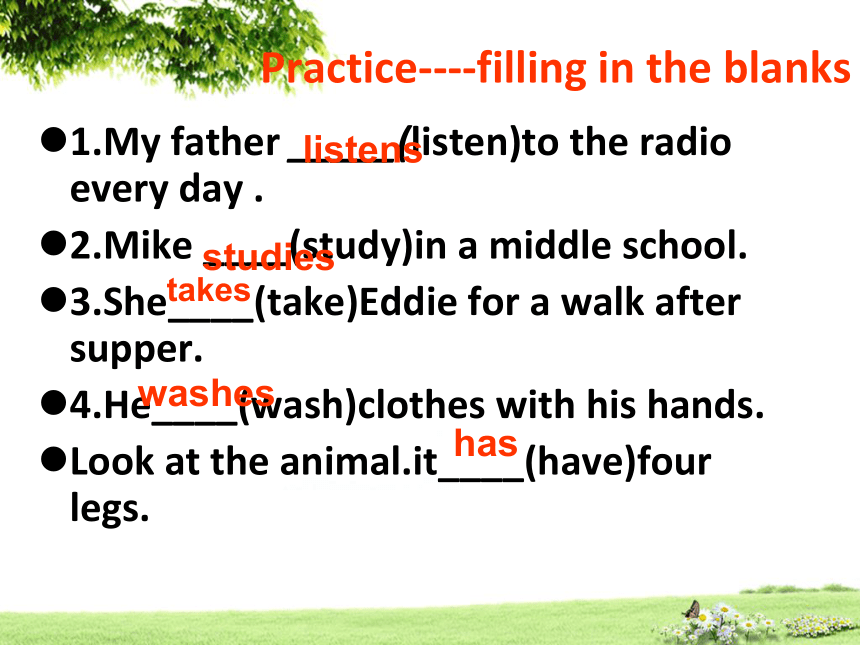山东省招远市第二中学高中外研版英语必修一Module3 My First Ride On a TrainReading语法课件(共36张PPT)
文档属性
| 名称 | 山东省招远市第二中学高中外研版英语必修一Module3 My First Ride On a TrainReading语法课件(共36张PPT) |

|
|
| 格式 | zip | ||
| 文件大小 | 2.1MB | ||
| 资源类型 | 教案 | ||
| 版本资源 | 外研版 | ||
| 科目 | 英语 | ||
| 更新时间 | 2015-10-31 00:00:00 | ||
图片预览












文档简介
课件36张PPT。一般现在时与现在进行时
招远一中 王丽丽一般现在时表示现在经常反复发生的动作,存在的状态,或习惯性的动作。常与一般现在时连用的词 1.every系列
every day weekyear month morning afternoonnight 2.频率副词 never
seldom
rarely
sometimes
often
usually
always
3.次数一次:once
两次: twice
三次: three times
一周两次: twice a week
每周六: every Saturday
每隔一周: every two weeksevery other week every second week
一般现在时的具体用法1.表现在的状态:
eg. She is twelve.
He is at work
2.表经常或习惯性的动作:
eg. I get up at 6:00 every morning .
He goes to swim every day.
3.表主语具备的性格或能力
She is lovely and active .
He speaks English.
4.表不受时间限制的普遍真理和自然规律
The moon goes around the earth.
Two and three is five .
5.格言或警句中
?Pride?goes?before?a?fall.?骄者必败。?一般现在时的构成一. 系动词be的一般现在时
二. 情态动词的一般现在时
三 .实义(行为)动词的一般现在时一.系动词be的一般现在时be (am is are )
肯定句: 主语+be +其他
主语为I 时→ am : I’m a student.
主语为单数→is : he’s my brother .
主语为复数→are: they’re excited.
否定句: 主语+be +not +其他
I’m not from shanxi.
He isn’t Chinese .
疑问句:Be +主语+其他?
Is he a student ? Am I crazy ? Are they happy ?
二.情态动词的一般现在时肯定句:主语+情态动词+动词原形+其他
注意:情态动词要用原型(can mustwillmayshall 有时表示语气也可以用couldwouldmightshould)
She can speak English .
否定句:情态动词之后加not
You mustn’t stop here .
疑问句:情态动词+主语+其他
Can she speak English ?
三.实义(行为)动词的一般现在时构成:肯定句:主语+行为动词+其他
These boys I WE like playing football.
The girl reads English every day.
如果主语是名词复数和第一人称I、 we时 ,谓语动词仍然用动词原形表示
We usually go to school at 7:30.
主语是任何一个单数名词或者是第三人称单数,行为动词要加s或es.
特别提一点:不可数名词也算作单数处理什么时候加s,什么时候加es?1.大多数动词在词尾直接加s:
如:read→ reads ,like →likes ,look →looks ,play→ plays
2.以辅音字母加y结尾的动词,要先将y 变为i再加es.
如fly→ flies , carry →carries , study→studies
3.以s,x,ch,sh,结尾的,在词尾加es,读/iz/
如: teach →teaches , watch→ watches ,
guess →guesses
4.以o 结尾的动词,在词尾加es, 读/z/
如: go →goes do→ doesPractice----filling in the blanks1.My father _____(listen)to the radio every day .
2.Mike ____(study)in a middle school.
3.She____(take)Eddie for a walk after supper.
4.He____(wash)clothes with his hands.
Look at the animal.it____(have)four legs.listensstudiestakeswasheshas一般现在时的否定句与疑问句否定:主语+助动词(do或does)+not +动词原形+其他
I don't want so much.
He doesn't work.
注意:主语为第一人称或复数时,助动词用do; 主语为单数时,助动词用does
疑问:助动词+主语+动词原形+其他?
Does the house have two rooms?
Do they play basketball after school? Practice----filling in the brakets1.Jodan____(play)basketball, he _____(not play ) football,___you___ (play)basketball?
2.I __(go)swimming everyday,but I _____(not go )shopping ,___Tom ___swimming ?
3.You ___(like)fish,but he _____(not)like fish.
4.I_____(have) three sisters,
he __(have)none,___you_____any sister ?
playsdoesn’tdoplaygodon’t go doesgolikedoesn’thavehasdohave特殊用法---一般现在时表将来1. 在时间或条件从句中,一般要用一般现在时表示将来,而不用一般将来时。
When Bill comes,ask him to wait for me.
I'll write to you as soon as I arrive there.
2. 谓语动词是 hope,take care that,make sure that 等后的宾语从句中,用一般现在时表示将来。
I hope they have a nice time next week.
Make sure that the windows are closed before you leave the room.3.谓语动词是:come,go,arrive,leave,start,begin,return,live,fly等可以和一个时间短语连用以表示已确定的,预先计划或安排好的将来的行为。
When does the bus start?
The boys starts school on Monday.男孩们星期一开学。
I leave tonight.我今天晚上动身。
这一用法代替了较常用的现在进行时态:
The boys are starting school on Monday.男孩儿们星期一就要开学了。
I’m leaving tonight.我今天晚上就动身。
这两种时态之间的差别是:
⑴一般现在时表客观规定计划 ,进行时表主观打算推测。:
I’m leaving tonight通常可能含有我决定离开的意思,但I leave tonight可指这是计划的一部分,但计划不一定是我订的。
⑵一般现在时要比现在进行时听起来更为正式。
如计划开办一个新分店的百货商店很可能说Our new branch opens next week而不说Our new branch is opening next week。其它特殊用法
1.在某些以here,there开头的句子中,用一般现在时表示正在发生的动作.
Here comes the bus.
There goes the bell .
2. 故事,新闻报道类的内容,为了体现其“新鲜”性,也用一般现在时来表示过去发生的事情。
The story begins in the year 1937. 故事开始于1937年。
practice1.The?father?as?well?as?children?_____?every?Sunday?afternoon?in?winter.??
A.?is?going???????B.?go????????C.?goes?????D.?are?going?
2.Send?my?regards?to?your?lovely?wife?when?you?_______?home.
?A.?wrote????B.?will?write???C.?have?written?D.?write?
3.Do?you?have?any?problems?if?you?___?this?job??
Well,?I’m?thinking?about?the?salary….??????????
? A.?offer?????? B.?will?offer???
C.?are?offered? D.?will?be?offered?CDC5.?According?to?the?timetable,?the?train?for?Shanghai?_____?at?7?o’clock?in?the?evening.?
A.?leaves???? B.?has?left?????
C.?was?left??? D.?will?leave
8.?—Can?I?help?you,?sir??
Yes,?I?bought?this?radio?yesterday,?but?it__.?
A.???didn’t?work??? B.?won’t?work????
C.?can’t?work???? D.?doesn’t?work?
AD现在进行时现在进行时由“be+v-ing”构成。
??肯定句式:主语+be(?am,?is,?are)+现在分词+其它.
He is reading a novel .
?否定句式:主语+be(am,?is,?are)?+not?+现在分词+其它.?
?I’m not cooking .
一般疑问句:Be(am,?is,?are)?+主语+现在分词+其它?
?Are they leaving tonight ?
?特殊疑问句:疑问词+be(am,?is,?are)+主语+现在分词+其它??
What are you doing now?现在进行时的应用??(1)当句子中有now时,常表示动作正在进行,这时要用现在进行时。
如:??They?are?playing?basketball?now.??
(2)以look,?listen开头的句子,提示我们动作正进行,这时要用现在进行时。
如:??Listen!She?is?singing?an?English?song.(3)表示当前一段时间或现阶段正在进行的动作,且此时有this?week,?these?days等时间状语,这时常用现在进行时。
如:?We?are?making?model?planes?these?days.
?(4)描述图片中的人物的动作,也为了表达更生动。此时也常用现在进行时。
如:??Look?at?the?picture.?The?children?are?flying?kites?in?the?park.(5)?表示现在(?指说话人说话时)?正在发生的事情。??
We?are?waiting?for?you.?
(6)?习惯进行:表示长期的或重复性的动作,说话时动作未必正在进行。?
Mr.?Green?is?writing?another?novel.(说话时并未在写,只处于写作的状态。)She?is?learning?piano?under?Mr.?Smith.?
??(7).?表示渐变的过程。动词有:get,?grow,?become,?turn,?run,?go,?begin等。
? The?leaves?are?turning?red.??????
It‘s?getting?warmer?and?warmer.?
(8)?与always,?constantly,?forever?等词连用,表示反复发生的动作或持续存在的状态,往往带有说话人的主观色彩。?
You?are?always?changing?your?mind.?
典型例题My?dictionary?___,?I?have?looked?for?it?everywhere?but?still___?it.??
A.?has?lost,?don’t?find???B.?is?missing,?don‘t?find?
C.?has?lost,?haven’t?found??D.?is?missing,?haven‘t?found.???
?答案D.?前句是一个仍在持续的状态,应用进行时,由于没有找到,其影响仍然存在,应用完成时,瞬间动词用于否定式时可用于完成时。?
现在进行时的特殊用法(1)现在进行时可用来表示将来。表示确切的计划、明确的意图和为将来安排好的活动。
所用动词通常表示位置移动的动词,常见的有:go, come, leave, sleep, stay, play, do, have, take, get to, see off等。
?fly,walk, ride, drive, take(a bus, a taxi)等的现在进行时也经常用于表示将来。
1. Betty is leaving for Guangzhou by plane at 3 this afternoon.
2. Some friends are coming to Anne’s birthday party this evening.? (2)现在进行时有时表示即将要发生的动作或情况。如:
I’m leaving. 我就走。
---Hurry up, it’s already very late. 快点,已经很晚了。
---OK, I’m coming.好的,我就来。
(3)表主观上的打算意图。Be doing =be going to do
I’m meeting Peter tonight.
They are getting married next month.
practice用现在进行时翻译下列句子
1. 穿上外衣!我带你去看医生。
Put on your coat! I’m taking you down to the doctor.
2.他两个小时后将去伦敦
He is leaving for London in two hours.
3. 我们明年冬天在澳大利亚过
We are spending next winter in Australia.
4. 你们晚餐吃什么呀?
What are you having for dinner?
5. 这小男孩上课老是讲话。
The boy is always talking in class.conclusion一般现在时与现在进行时的区别
一般现在时
1.表示事物的本质特性或客观存在,没有时限性。
The table feels soft。(feels) 表特性特征。
Japan lives in the east of China。 (lives) 表客观事实
2.现阶段经常性、习惯性的行为,可带频率时间。
The shop closes at 7:30 p.m.
Father doesn’t smoke. (习惯)
3.表说话时的状态,感觉或结果,一般用状态动词.
如:It doesn’t matter. Does it hurt? (感觉结果)4.一般现在时的特殊用法:
-在条件、时间下、在让步从句中用现在时代替将来。
-If you go there,I’ll help you.
—用在begin,come,go,leave,return,open,close 等短暂谓语动词表规定计划。
The plane takes off at 11:30. (不受主观支配的计划)
-在剧本、解说、标题或there(here)开头的句中表进行
There goes the bell/Here comes Mr.Wang.
I declare the meeting opens.(正在宣布)
He meets the ball and hits back to No.2 (正在发生)
现在进行时
1.说话时正在发生,进行的动作
Look! Dark clouds are gathering . (正在发生)
2.表现阶段正在进行,但此刻不一定正在进行的事。
He usually gets up at 6:00,but this week he is getting up at 7:00. (现阶段正在进行,但说话时不一定在起床)3.现在进行时的特殊意义 -表示主观打算常用于 go,come,leave,start,begin 等,位移、趋向动词
How long are you staying here (准备停留)
-表示眼前刚过去的语意即“话音刚落”,适用于tell,say,talk,discuss ….
You don’t believe it You know I’m telling the truth.
-表示安慰、关心、喜欢、讨厌等感彩。
He is always making noises in class. (讨厌)
-在条件、时间、让步状语从句中表示将来正在进行。
Don’t bother him if he is reading this time tomorro
Practice ?1.---I’m going to the States?
---How long ___ you___ in the States?
A. are; stayed ? B. are; staying C. have; stayed ??? D. did; stay
2 .I have two tickets to Beijing. I _______ my father.
A. am taking???????????B. have taken???????
C. take???????????????? D. will have takenBA3.Do?you?have?any?problems?if?you?_____ this?job??
--Well,?I’m?thinking?about?the?salary…..
A.?offer????????? B.?will?offer??????
C.?are?offered???????D.?will?be?offered?CTHANKS FOR COMING
招远一中 王丽丽一般现在时表示现在经常反复发生的动作,存在的状态,或习惯性的动作。常与一般现在时连用的词 1.every系列
every day weekyear month morning afternoonnight 2.频率副词 never
seldom
rarely
sometimes
often
usually
always
3.次数一次:once
两次: twice
三次: three times
一周两次: twice a week
每周六: every Saturday
每隔一周: every two weeksevery other week every second week
一般现在时的具体用法1.表现在的状态:
eg. She is twelve.
He is at work
2.表经常或习惯性的动作:
eg. I get up at 6:00 every morning .
He goes to swim every day.
3.表主语具备的性格或能力
She is lovely and active .
He speaks English.
4.表不受时间限制的普遍真理和自然规律
The moon goes around the earth.
Two and three is five .
5.格言或警句中
?Pride?goes?before?a?fall.?骄者必败。?一般现在时的构成一. 系动词be的一般现在时
二. 情态动词的一般现在时
三 .实义(行为)动词的一般现在时一.系动词be的一般现在时be (am is are )
肯定句: 主语+be +其他
主语为I 时→ am : I’m a student.
主语为单数→is : he’s my brother .
主语为复数→are: they’re excited.
否定句: 主语+be +not +其他
I’m not from shanxi.
He isn’t Chinese .
疑问句:Be +主语+其他?
Is he a student ? Am I crazy ? Are they happy ?
二.情态动词的一般现在时肯定句:主语+情态动词+动词原形+其他
注意:情态动词要用原型(can mustwillmayshall 有时表示语气也可以用couldwouldmightshould)
She can speak English .
否定句:情态动词之后加not
You mustn’t stop here .
疑问句:情态动词+主语+其他
Can she speak English ?
三.实义(行为)动词的一般现在时构成:肯定句:主语+行为动词+其他
These boys I WE like playing football.
The girl reads English every day.
如果主语是名词复数和第一人称I、 we时 ,谓语动词仍然用动词原形表示
We usually go to school at 7:30.
主语是任何一个单数名词或者是第三人称单数,行为动词要加s或es.
特别提一点:不可数名词也算作单数处理什么时候加s,什么时候加es?1.大多数动词在词尾直接加s:
如:read→ reads ,like →likes ,look →looks ,play→ plays
2.以辅音字母加y结尾的动词,要先将y 变为i再加es.
如fly→ flies , carry →carries , study→studies
3.以s,x,ch,sh,结尾的,在词尾加es,读/iz/
如: teach →teaches , watch→ watches ,
guess →guesses
4.以o 结尾的动词,在词尾加es, 读/z/
如: go →goes do→ doesPractice----filling in the blanks1.My father _____(listen)to the radio every day .
2.Mike ____(study)in a middle school.
3.She____(take)Eddie for a walk after supper.
4.He____(wash)clothes with his hands.
Look at the animal.it____(have)four legs.listensstudiestakeswasheshas一般现在时的否定句与疑问句否定:主语+助动词(do或does)+not +动词原形+其他
I don't want so much.
He doesn't work.
注意:主语为第一人称或复数时,助动词用do; 主语为单数时,助动词用does
疑问:助动词+主语+动词原形+其他?
Does the house have two rooms?
Do they play basketball after school? Practice----filling in the brakets1.Jodan____(play)basketball, he _____(not play ) football,___you___ (play)basketball?
2.I __(go)swimming everyday,but I _____(not go )shopping ,___Tom ___swimming ?
3.You ___(like)fish,but he _____(not)like fish.
4.I_____(have) three sisters,
he __(have)none,___you_____any sister ?
playsdoesn’tdoplaygodon’t go doesgolikedoesn’thavehasdohave特殊用法---一般现在时表将来1. 在时间或条件从句中,一般要用一般现在时表示将来,而不用一般将来时。
When Bill comes,ask him to wait for me.
I'll write to you as soon as I arrive there.
2. 谓语动词是 hope,take care that,make sure that 等后的宾语从句中,用一般现在时表示将来。
I hope they have a nice time next week.
Make sure that the windows are closed before you leave the room.3.谓语动词是:come,go,arrive,leave,start,begin,return,live,fly等可以和一个时间短语连用以表示已确定的,预先计划或安排好的将来的行为。
When does the bus start?
The boys starts school on Monday.男孩们星期一开学。
I leave tonight.我今天晚上动身。
这一用法代替了较常用的现在进行时态:
The boys are starting school on Monday.男孩儿们星期一就要开学了。
I’m leaving tonight.我今天晚上就动身。
这两种时态之间的差别是:
⑴一般现在时表客观规定计划 ,进行时表主观打算推测。:
I’m leaving tonight通常可能含有我决定离开的意思,但I leave tonight可指这是计划的一部分,但计划不一定是我订的。
⑵一般现在时要比现在进行时听起来更为正式。
如计划开办一个新分店的百货商店很可能说Our new branch opens next week而不说Our new branch is opening next week。其它特殊用法
1.在某些以here,there开头的句子中,用一般现在时表示正在发生的动作.
Here comes the bus.
There goes the bell .
2. 故事,新闻报道类的内容,为了体现其“新鲜”性,也用一般现在时来表示过去发生的事情。
The story begins in the year 1937. 故事开始于1937年。
practice1.The?father?as?well?as?children?_____?every?Sunday?afternoon?in?winter.??
A.?is?going???????B.?go????????C.?goes?????D.?are?going?
2.Send?my?regards?to?your?lovely?wife?when?you?_______?home.
?A.?wrote????B.?will?write???C.?have?written?D.?write?
3.Do?you?have?any?problems?if?you?___?this?job??
Well,?I’m?thinking?about?the?salary….??????????
? A.?offer?????? B.?will?offer???
C.?are?offered? D.?will?be?offered?CDC5.?According?to?the?timetable,?the?train?for?Shanghai?_____?at?7?o’clock?in?the?evening.?
A.?leaves???? B.?has?left?????
C.?was?left??? D.?will?leave
8.?—Can?I?help?you,?sir??
Yes,?I?bought?this?radio?yesterday,?but?it__.?
A.???didn’t?work??? B.?won’t?work????
C.?can’t?work???? D.?doesn’t?work?
AD现在进行时现在进行时由“be+v-ing”构成。
??肯定句式:主语+be(?am,?is,?are)+现在分词+其它.
He is reading a novel .
?否定句式:主语+be(am,?is,?are)?+not?+现在分词+其它.?
?I’m not cooking .
一般疑问句:Be(am,?is,?are)?+主语+现在分词+其它?
?Are they leaving tonight ?
?特殊疑问句:疑问词+be(am,?is,?are)+主语+现在分词+其它??
What are you doing now?现在进行时的应用??(1)当句子中有now时,常表示动作正在进行,这时要用现在进行时。
如:??They?are?playing?basketball?now.??
(2)以look,?listen开头的句子,提示我们动作正进行,这时要用现在进行时。
如:??Listen!She?is?singing?an?English?song.(3)表示当前一段时间或现阶段正在进行的动作,且此时有this?week,?these?days等时间状语,这时常用现在进行时。
如:?We?are?making?model?planes?these?days.
?(4)描述图片中的人物的动作,也为了表达更生动。此时也常用现在进行时。
如:??Look?at?the?picture.?The?children?are?flying?kites?in?the?park.(5)?表示现在(?指说话人说话时)?正在发生的事情。??
We?are?waiting?for?you.?
(6)?习惯进行:表示长期的或重复性的动作,说话时动作未必正在进行。?
Mr.?Green?is?writing?another?novel.(说话时并未在写,只处于写作的状态。)She?is?learning?piano?under?Mr.?Smith.?
??(7).?表示渐变的过程。动词有:get,?grow,?become,?turn,?run,?go,?begin等。
? The?leaves?are?turning?red.??????
It‘s?getting?warmer?and?warmer.?
(8)?与always,?constantly,?forever?等词连用,表示反复发生的动作或持续存在的状态,往往带有说话人的主观色彩。?
You?are?always?changing?your?mind.?
典型例题My?dictionary?___,?I?have?looked?for?it?everywhere?but?still___?it.??
A.?has?lost,?don’t?find???B.?is?missing,?don‘t?find?
C.?has?lost,?haven’t?found??D.?is?missing,?haven‘t?found.???
?答案D.?前句是一个仍在持续的状态,应用进行时,由于没有找到,其影响仍然存在,应用完成时,瞬间动词用于否定式时可用于完成时。?
现在进行时的特殊用法(1)现在进行时可用来表示将来。表示确切的计划、明确的意图和为将来安排好的活动。
所用动词通常表示位置移动的动词,常见的有:go, come, leave, sleep, stay, play, do, have, take, get to, see off等。
?fly,walk, ride, drive, take(a bus, a taxi)等的现在进行时也经常用于表示将来。
1. Betty is leaving for Guangzhou by plane at 3 this afternoon.
2. Some friends are coming to Anne’s birthday party this evening.? (2)现在进行时有时表示即将要发生的动作或情况。如:
I’m leaving. 我就走。
---Hurry up, it’s already very late. 快点,已经很晚了。
---OK, I’m coming.好的,我就来。
(3)表主观上的打算意图。Be doing =be going to do
I’m meeting Peter tonight.
They are getting married next month.
practice用现在进行时翻译下列句子
1. 穿上外衣!我带你去看医生。
Put on your coat! I’m taking you down to the doctor.
2.他两个小时后将去伦敦
He is leaving for London in two hours.
3. 我们明年冬天在澳大利亚过
We are spending next winter in Australia.
4. 你们晚餐吃什么呀?
What are you having for dinner?
5. 这小男孩上课老是讲话。
The boy is always talking in class.conclusion一般现在时与现在进行时的区别
一般现在时
1.表示事物的本质特性或客观存在,没有时限性。
The table feels soft。(feels) 表特性特征。
Japan lives in the east of China。 (lives) 表客观事实
2.现阶段经常性、习惯性的行为,可带频率时间。
The shop closes at 7:30 p.m.
Father doesn’t smoke. (习惯)
3.表说话时的状态,感觉或结果,一般用状态动词.
如:It doesn’t matter. Does it hurt? (感觉结果)4.一般现在时的特殊用法:
-在条件、时间下、在让步从句中用现在时代替将来。
-If you go there,I’ll help you.
—用在begin,come,go,leave,return,open,close 等短暂谓语动词表规定计划。
The plane takes off at 11:30. (不受主观支配的计划)
-在剧本、解说、标题或there(here)开头的句中表进行
There goes the bell/Here comes Mr.Wang.
I declare the meeting opens.(正在宣布)
He meets the ball and hits back to No.2 (正在发生)
现在进行时
1.说话时正在发生,进行的动作
Look! Dark clouds are gathering . (正在发生)
2.表现阶段正在进行,但此刻不一定正在进行的事。
He usually gets up at 6:00,but this week he is getting up at 7:00. (现阶段正在进行,但说话时不一定在起床)3.现在进行时的特殊意义 -表示主观打算常用于 go,come,leave,start,begin 等,位移、趋向动词
How long are you staying here (准备停留)
-表示眼前刚过去的语意即“话音刚落”,适用于tell,say,talk,discuss ….
You don’t believe it You know I’m telling the truth.
-表示安慰、关心、喜欢、讨厌等感彩。
He is always making noises in class. (讨厌)
-在条件、时间、让步状语从句中表示将来正在进行。
Don’t bother him if he is reading this time tomorro
Practice ?1.---I’m going to the States?
---How long ___ you___ in the States?
A. are; stayed ? B. are; staying C. have; stayed ??? D. did; stay
2 .I have two tickets to Beijing. I _______ my father.
A. am taking???????????B. have taken???????
C. take???????????????? D. will have takenBA3.Do?you?have?any?problems?if?you?_____ this?job??
--Well,?I’m?thinking?about?the?salary…..
A.?offer????????? B.?will?offer??????
C.?are?offered???????D.?will?be?offered?CTHANKS FOR COMING
